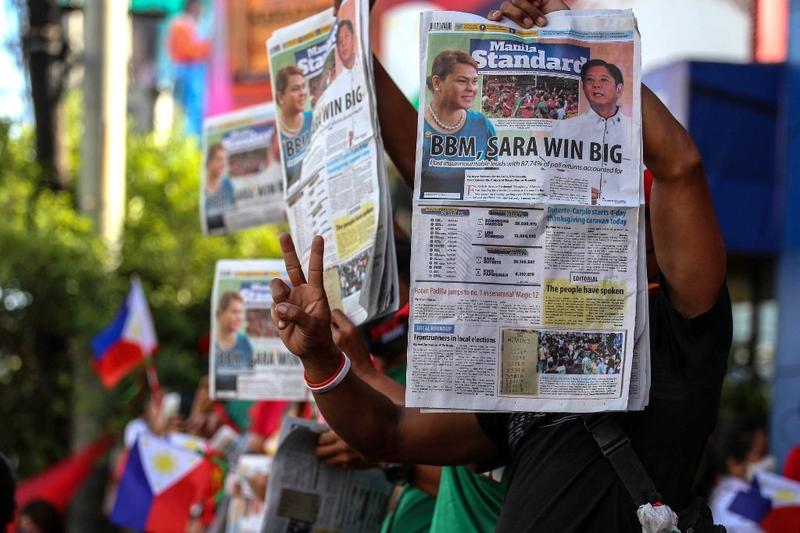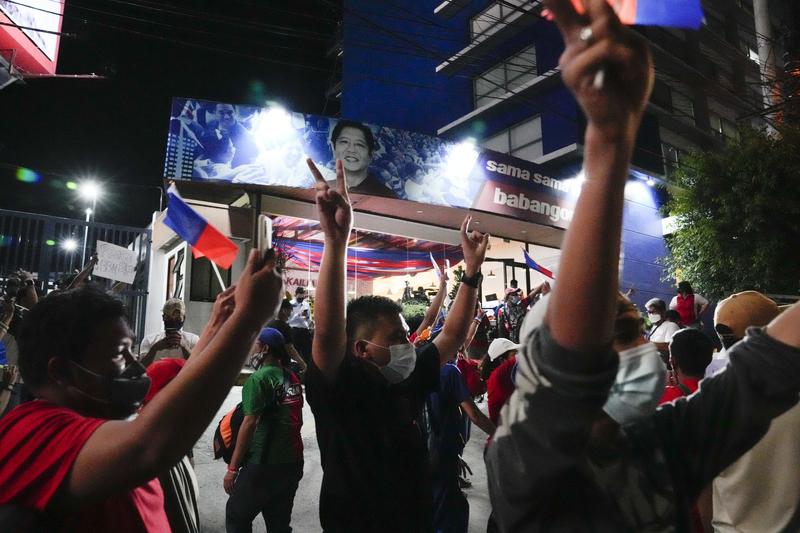 Supporters of Philippine presidential candidate Ferdinand Marcos Jr hold newspapers with coverage of his landslide presidential victory, outside the campaign headquarters in Mandaluyong City, Metro Manila, on May 10, 2022. (JAM STA ROSA / AFP)
Supporters of Philippine presidential candidate Ferdinand Marcos Jr hold newspapers with coverage of his landslide presidential victory, outside the campaign headquarters in Mandaluyong City, Metro Manila, on May 10, 2022. (JAM STA ROSA / AFP)
MANILA – Ferdinand Romualdez Marcos Jr won a landslide victory in Monday's Philippine presidential election as voters pin hope on him to bolster the economy amid the raging COVID-19 pandemic.
Marcos, 64, son of former President Ferdinand Marcos, secured over 30 million votes, according to unofficial data released by the Commission on Elections on Tuesday. It is the first win by a majority in presidential elections in the Southeast Asian country since 1986, beating Marcos' main rival, incumbent Vice President Maria Leonor Robredo.
READ MORE: Marcos Jr triumphs in Philippine presidential election
His running mate, Sara Duterte-Carpio, the 43-year-old daughter of outgoing President Rodrigo Duterte, also won by a majority in the vice presidential race.
Marcos has the backing of both his family's loyalists in the country's north and Duterte-Carpio's supporters in the south, dubbed the "solid north-south." He won the endorsement of many political parties and officials across the country.
Despite the challenges ahead, the recovery of the Philippine economy is forecast to gain traction this year, fueled by strengthening domestic investment and consumption
Analysts said Marcos' social media campaign has successfully attracted millions of young people who are the bulk of the registered voters.
"Marcos calls for unity among Filipinos, and he is being seen as the only candidate who will pursue the legacies of President Rodrigo Duterte, something that the majority of Filipinos clamor for," said Anna Malindog-Uy, researcher of Philippine-BRICS Strategic Studies.
During his campaign, Marcos said he will work to develop the country by addressing the impact of the lingering COVID-19 pandemic, creating new jobs, improving digital infrastructure and agriculture, enhancing public health and stimulating domestic consumption.
The former senator is expected to strengthen ties with the Philippines' neighbors. Last year, Marcos told local media that China and the Philippines are neighbors and consolidating the good-neighborly friendship between the two countries is for the people's benefit. He vowed to strengthen the bilateral relations and promote cooperation in economy and trade, education, and people-to-people and cultural exchanges.
One of his priorities is to revive a struggling economy in his six-year term.
Data from Philippine Statistics Authority showed that 23.7 percent of the country's population of nearly 110 million live in poverty. The unemployment rate peaked at 17.6 percent in April 2020 amid the COVID-19 pandemic and fell to 6.4 percent in February this year, still above the pre-pandemic level of 5.1 percent in 2019. More people are expected to get jobs as the government eases COVID-19 restrictions, allowing more businesses to resume operations or increase capacity.
From 2020 to this January, the Department of Finance said the Philippines had borrowed 1.3 trillion pesos (about $25 billion) to fund the efforts against COVID-19. According to Asian Development Bank, the Philippine government's debt-to-GDP ratio widened to 60.5 percent in 2021 from 54.6 percent in 2020.
ALSO READ: Philippine poll body junks disqualification case against Marcos Jr
"The Marcos administration should address rising expectations from the people in their daily struggle against unemployment, inflation, poor health services, especially amid the COVID-19 pandemic, and the huge amount of foreign debts incurred by the government," said Bobby M Tuazon, director of Policy Studies at the Center for People Empowerment in Governance of the Philippines.
 Supporters flash signs as they arrive at the headquarters of Ferdinand Marcos Jr in Mandaluyong, Philippines late on May 9, 2022. (AARON FAVILA / AP)
Supporters flash signs as they arrive at the headquarters of Ferdinand Marcos Jr in Mandaluyong, Philippines late on May 9, 2022. (AARON FAVILA / AP)
Despite the challenges ahead, the recovery of the Philippine economy is forecast to gain traction this year, fueled by strengthening domestic investment and consumption. The government's GDP target for 2022 is between 7 to 9 percent.
According the Asian Development Bank's forecast in the Asian Development Outlook 2022, the Philippine economy is expected to grow by 6.0 percent this year, rising further by 6.3 percent in 2023.
Furthermore, against the backdrop of the rising uncertainty of the geopolitical situation, how to stick to an independent foreign policy and take firm control of regional security will be a test for the Marcos administration.


